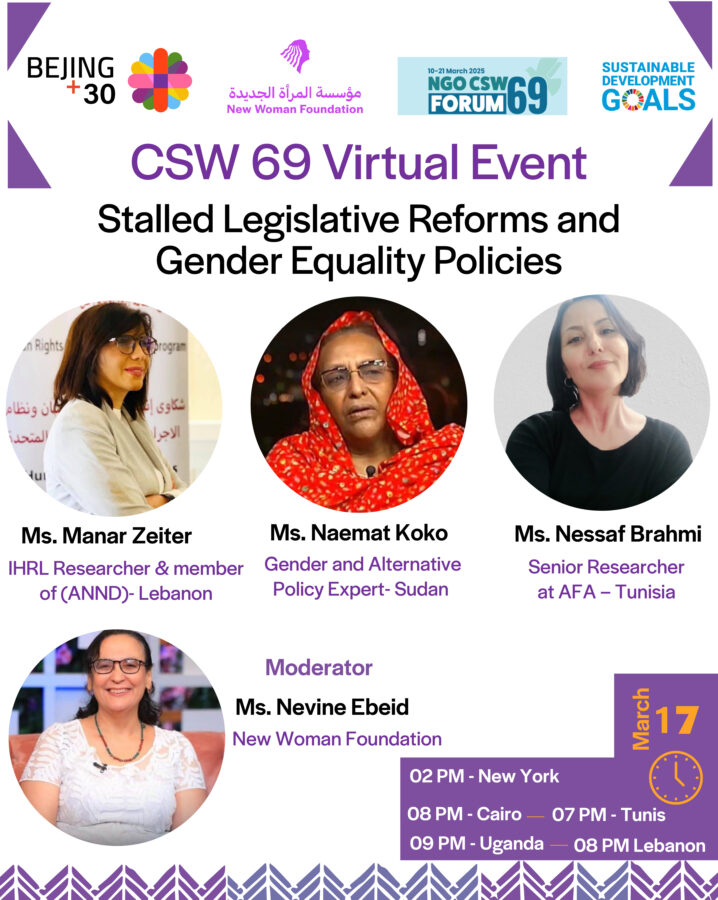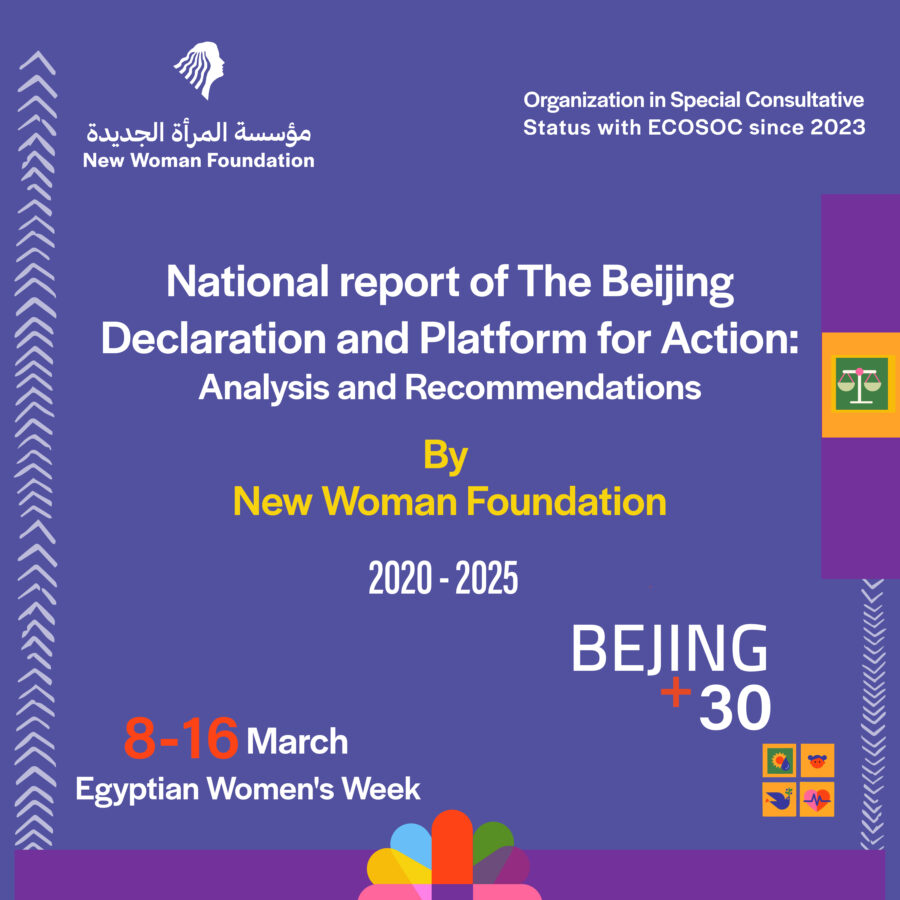- Contact Us
- 0020233382706
- nwrc@nwrcegypt.org
The 61st session of the UN Commission on the Status of Women in March this year on the economic empowerment of women

Saudi Arabia: King issues decree loosening some guardianship regulations, but women remain under control of men in most areas
May 13, 2017
Sheikh Mohammed surprises Arab Hope Makers ceremony, awards top prize to all nominees
May 21, 2017| Proposed Legislations amendments measures for the action on the issue in Egyp | International Conventions | Issues raised in CSW 61 –March 2017 on Economic Empowerment of Women |
|
· Article (11) in the Egyptian constitution, namely the paragraph that states: “The State shall ensure the achievement of equality between women and men in all civil, political, economic, social, and cultural rights in accordance with the provisions of this Constitution. … State and their appointment in judicial bodies and authorities without discrimination.” Discrimination and incitement of hatred is a crime punished by Law. The State shall take necessary measures for eliminating all forms of discrimination, and the Law shall regulate creating an independent commission for this purpose.
According to articles (11) and (53) of the constitutions, demands of establishing an anti-discrimination commission, whose missions include eliminating forms of gender-based discrimination in the workplace, should be met
Additionally, implementation of the national strategy for empowering Egyptian women 2030 should be followed up and participated in. said strategy provides, in the two axes of political and economic empowerment, for larger proportions of women in leadership positions in state executive bodies, and enhance their performance as follows: · Plan for higher proportions of women in positions of governor, and deputy governor through developing integrated programs for young female leaders so as to equip them for assuming said positions and to train them on carrying out its duties · Developing work systems that ensure participation and representation of women in state executive bodies, namely in processes of planning, policymaking, and budgeting on the local, national, and sectoral levels · Complete the establishment of EEO Units in ministries, public authorities, business sector, and localities and call on to judicial bodies and private sector to establish similar units. · Designing policies to ensure commitment of private sector to proper representation of women in corporates’ boards
|
· ILO (1975) Recommendation concerning Equal Opportunities and Equal Treatment for Men and Women Workers. States developing plans with a view to promoting equality of opportunity and treatment for women workers This recommendation is related to implementing convention no. 111 concerning discrimination in employment and occupation, which is concerned with implementing national policies aiming at promoting equal opportunities in employment and occupation to eliminate discrimination in employment and training Article 14 of CEDAW 1979, where state parties recognize the necessity of modifying the conventional roles of men and women in society and in their families, with a view to achieving equality between men and women.
|
Insignificant proportion of women in senior management in the public sector
· CSW calls for fostering efforts in the public and the private sector to keep women in the workforce, and to establish more gender balance in management. · Member states called for ending gender-based discrimination stressing the vital importance of women’s voices in making decisions that concerns them |
| ILO adopts a series of measures:
Ø Facilitate saving contributions of workers’ in informal sectors and workers with no fixed income in insurance funds to benefit from later on Ø Support of governments in contributions to promote participation in social insurance systems Ø Support of governments to business owners and their employees in informal sector, who are incapable of paying their contributions in insurance Ø Place an accountable and transparent insurance system Ø Allow the establishment of various insurance programs that accommodate marginalized groups through cooperatives, syndicates, and NGOs Ø ILO issued convention no. 189 concerning house workers of both sexes |
Increase women representation in informal economy
· CSW has expressed its deep concern regarding the status of immigrant women working in informal economy, as they are subject to harm and abuse. CSW recognizes the necessity of adopting policies to improve status of said category of women, and calls for developing gender-responsive immigration policies that enhances immigrant women’s economic empowerment. · CSW has also brought to light status of women in the informal sector where they do not have social protection, therefore the CSW urgently calls for reform of social protection system
|
|
| · Cooperate with syndicates concerning activation of monitoring mechanisms, and support women subject to sexual harassment in the workplace or as a result of working conditions |
· Declaration on the Elimination of Violence against Women, adopted by UN as per its decree 48/104 in 20 December 1993 |
Sexual harassment in the workplace |
|
Work to activate article (11) of the constitution, namely the paragraph concerning “The State shall protect women against all forms of violence and ensure enabling women to strike a balance between family duties and work requirements.” Article 91: “a female worker having spent ten months in the service of the employer or more shall have the right to a maternity leave of ninety days, with a compensation equal to her comprehensive wage, comprising the period before delivery and after parturition, providing she shall submit a medical certificate including the date on which delivery most likely took place a female worker shall not be required to work during the forty-five days following childbirth”
Article 94: “a female worker in the establishment where fifty workers or more are employed shall have the right to obtain a leave without pay for a period not exceeding two years, to care for her child. this leave shall not be entitled more than twice throughout her service period” ثمة اختلاف في التشريعات المعنية بشأن تحديد عدد مرات إجازة الوضع ورعاية الطفل التي يحق للعاملات الحصول عليها؛ فكما اتضح فيما سبق ينص قانون العمل رقم 12 على مرتين فحسب، بينما طبقا لقانون الطفل 12 لسنة 1996 والمعدل بالقانون 126 لسنة 2008 في مادتيه (70) و(72) فينص على حق العاملة في الحصول على ثلاث مرات لاجازتى الوضع ورعاية الطفل، وبموجب المادة 3 من مواد الإصدار والمادة 5 من الأحكام العامة بقانون العمل والقاعدة القانونية التى تنص على أن القوانيين الأحدث تجب الأقدم وإذا كان القانون الحديث يعطي حقوق أفضل للعامل والعاملة من القوانيين السابقة يكون هو القانون الواجب التطبيق،وبناء عليه يحق للنساء العاملات الحصول على إجازات الوضع ورعاية الطفل لثلاثة مرات. There are differences in the legislations regarding limitation of the number of maternity and family leaves workers are entitled to. As shown in the previous text, labor law no. 12 stipulates that they are entitled to two leaves only, whereas child law no. 12 of 1996, amended by law no. 126 of 2008 articles (70) and (72) states that female workers are entitled two three maternity and family leaves. According to article 3 of issue articles and article 5 of general provisions of labor law. The legal rule states that rather recent laws invalidate older laws if the recent laws grant workers further rights than those stipulated in older laws, thus becoming applicable. Therefore, working women are entitled three maternity and family leaves
Hence, action should be initiated with syndicates to adopt labor law amendments to grant working women equal rights regarding maternity and family leaves. Moreover, a dialogue should be held with them (syndicate officials of both genders) regarding amendments of family leave for both parents.
|
Maternity Protection Convention stipulates: – Member states should seek to extend maternity leave, referred to in article 4 of the convention, to eighteen weeks minimum. – Maternity leave, in case of multiple births, should be stipulated in an article – Measures should be taken to ensure that women have the right to freely decide the period of time for any non-mandatory part of their maternity leave before or after birth. – Both parents should enjoy parental leave during the period following maternity leave. |
Reproductive rights and childcare in the workplace · Professions dominated by women should not suffer from any defect due to pregnancy and maternity, the agreed conclusions emphasize the need to ensure that women and men receive paid parental leave, and that men are encouraged to use such allowances. · Both women and men have the right to access paid parental leave and men are encouraged use such allowances · Measures such as increased flexibility in working arrangements; facilitation of breastfeeding for working mothers; development of infrastructure and technology; provision of affordable and good quality care facilities for children and other dependents; adaptation of educational systems to allow pregnant adolescents as well as single mothers to continue their education. CSW sheds the light on previously mentioned measures in the context of promotion of women’s economic empowerment. Legal and policy frameworks must also be enforced to end sexual harassment in the workplace. The Committee recognizes the importance of women’s access to sexual and reproductive health care services to enable them to fully participate in the workforce. |
Reproductive rights and childcare in the workplace
Measures such as increased flexibility in working arrangements; facilitation of breastfeeding for working mothers; development of infrastructure and technology; provision of affordable and good quality care facilities for children and other dependents; adaptation of educational systems to allow pregnant adolescents as well as single mothers to continue their education. CSW sheds the light on previously mentioned measures in the context of promotion of women’s |
· Wage Equality convention no. 100, issues by ILO · Item 7 in the agenda of ILO meeting in 1951. Said item highlights the importance of application of the convention, as it lays down the general principals of gender wage equality for work of equal value
|
Widening gender wage gap · It currently stands at about 23% globally, given that it is still persistent in all countries · Member states have expressed their concern in this regard, in addition to the decreasing salaries women receive, that mostly do not suffice for a decent living. They commit to the final agreement to implement equal pay policies through community dialogues, mass negotiations, and other measures · Member states of CSW acknowledged that providing equal pay and social protection can create appropriate work for paid care and house workers. It also enables fast development of technologies and new sectors, and provides new work vacancies for women. However, providing said vacancies requires acquiring proper education and training |



